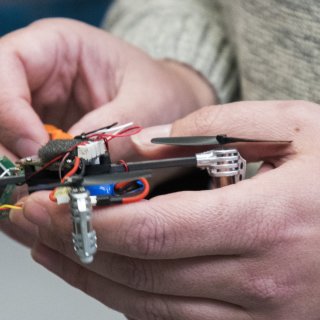Our vision is to introduce innovative robotics technologies that will enable robots to work together with humans in human environments, contributing to all kinds of services and labour beyond ‘confined’ industrial environments.
The mission is to perform interdisciplinary research in a coordinated fashion to address all the aspects of modern robotics, including the non-technical aspects. Areas of expertise are bio-inspired robot design, human-robot interaction, functional decomposition, cybernetics, spatial presence, autonomous control and machine learning.
The scientific challenge for the robotics institute is to get robots and humans to work together effectively in unstructured environments, and real settings. It does not involve the classical industrial robots, for example. We have chosen three themes: swarm robots, robots that work and interactive robots.
Robotics is predicted to be the next big step in the digital revolution and will have an unprecedented impact on our lives It provides an answer to some of the grand challenges of the 21st century, such as: reliable labour, assisting or replacing humans where conditions are dangerous, unhealthy or unethical, and finally, supporting humans in safety and observation. Additionally, robotics is believed to offer a solution to social challenges such as the aging society.
As technology reaches a level where complex robotic tasks become feasible and affordable, a more personal breed of robots is coming and getting a position in our lives quickly. These more personal robots must have human interaction on many different levels, which is raising challenges with respect to: safety, responsibility, controllability, and usability. The, up till now, mainly technically dominated field of robotics should therefore be enriched with a range of other disciplines. These are necessary to bring robotics to the next stage of socio-technical systems.
The Delft University of Technology holds, like no other university, a perfect and unique set of cards to meet these challenges. Both the ‘hard’-robot disciplines (mechatronics, artificial intelligence, embedded systems, control) and the ‘soft’-robot disciplines (man-machine systems, user interaction, architecture and living environments, ethics and security) are very well established at the Delft University.
By uniting the various disciplines in a user-centred research approach within the TU Delft Robotics Institute, the robotics challenge can be approached on a systems level. The result is reliable and productive robot systems with the appropriate behaviour, context and human interaction. This brings the Delft University to a globally leading position in the much promising robotics field.
To get a complete overview of the developments in the field of robotics - and the institute’s vision on these developments - download the included position paper.
